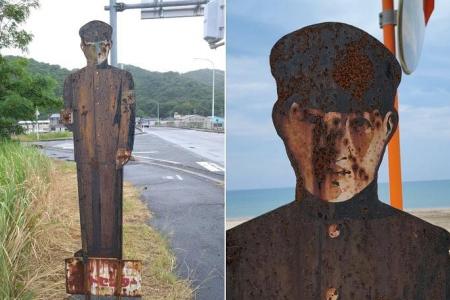‘Creepy’ schoolboy signs become talk of Japanese coastal town, new tourist spot
Picture this: As you are taking a walk on a beach in a sleepy Japanese coastal town as night falls, you come across an isolated, unmoving figure of a stern youth in school uniform. It is only upon approaching on close quarters that you discover that it is in fact an inanimate road sign.
That is an actual prospect facing visitors to Iwami, a town in western Japanese prefecture Tottori. Relics of an unknown past, the signs are taking on a new life as landmarks of the town better known for its coastal scenery and for being the setting for an anime based on school competitive swimming.
In photos posted by locals on social media, the signs depicting a schoolboy in uniform with a cap and a band with the word 文, Japanese for literature, on his left arm, are visibly aged by rust that also alter his facial expressions from neutral to angry.
Although some find the schoolboy’s expression and presence “creepy”, Iwami residents have increasingly started taking and sharing photos of the town’s latest tourist attraction, which no one seems to be sure of what they were made for.
At least four of these signs have been located in the coastal town populated by fewer than 11,000 people, with one at Haneo Beach and others close to a port and residential areas.
Santec, a local souvenir store that sells merchandise related to the Free! Iwatobi Swim Club animated series as well as a blue-coloured curry inspired by the sea, has also begun stocking pin badges of the signs with the intention of giving tourists more reasons to visit Iwami.
“The badge is completely a joke, and it doesn’t make much money,” Santec president Kenta Yamamoto, 44, told Japanese newspaper Mainichi Shimbun.
He had been scouring social media seeking ideas for tourist attractions when he came across these images that were highly discussed, adding that visitors who were Free! fans making their pilgrimages had begun to decrease after the Covid-19 pandemic.
The Iwami native said the signs have been in the town since his childhood, but did not know why they were put up.
As the schoolboy signs have been found close to pedestrian crossings and also have openings for inserting poles, some people have speculated that they may have been erected to signal a reminder for road safety, potentially to “watch over” the town’s schoolchildren.
“At any rate, it attracts attention, and I hope the badges become an impetus for people to learn about Iwami and come enjoy our beaches, hot springs and cuisine,” Mr Yamamoto said.
The badges which are sold in a set of six for 1,100 yen (S$10.30) are currently sold out on Santec’s online store. Other netizens have shared that they can be found at some capsule toy dispensers for 200 yen each.
Get The New Paper on your phone with the free TNP app. Download from the Apple App Store or Google Play Store now


